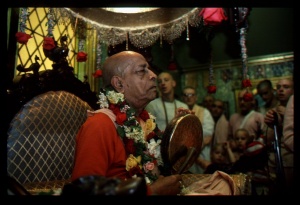CC Madhya 2.80: Difference between revisions
m (1 revision(s)) |
No edit summary |
||
| Line 1: | Line 1: | ||
{{ | [[Category:Sri Caitanya-caritamrta - Madhya-lila Chapter 02|C080]] | ||
<div style="float:left">'''[[Sri Caitanya-caritamrta|Śrī Caitanya-caritāmṛta]] - [[CC Madhya|Madhya-līlā]] - [[CC Madhya 2|Chapter 2: The Ecstatic Manifestations of Lord Śrī Caitanya Mahāprabhu]]'''</div> | |||
<div style="float:right">[[File:Go-previous.png|link=CC Madhya 2.79|Madhya-līlā 2.79]] '''[[CC Madhya 2.79|Madhya-līlā 2.79]] - [[CC Madhya 2.81|Madhya-līlā 2.81]]''' [[File:Go-next.png|link=CC Madhya 2.81|Madhya-līlā 2.81]]</div> | |||
{{CompareVersions|CC|Madhya 2.80|CC 1975|CC 1996}} | |||
{{RandomImage}} | |||
==== TEXT 80 ==== | ==== TEXT 80 ==== | ||
<div | <div class="verse"> | ||
pūrve vraja-vilāse, yei tina abhilāṣe, | :pūrve vraja-vilāse, yei tina abhilāṣe, | ||
yatneha āsvāda nā haila | :yatneha āsvāda nā haila | ||
śrī-rādhāra bhāva-sāra, āpane kari’ aṅgīkāra, | :śrī-rādhāra bhāva-sāra, āpane kari’ aṅgīkāra, | ||
sei tina vastu āsvādila | :sei tina vastu āsvādila | ||
</div> | </div> | ||
| Line 14: | Line 18: | ||
==== SYNONYMS ==== | ==== SYNONYMS ==== | ||
<div | <div class="synonyms"> | ||
''pūrve''—formerly; ''vraja-vilāse''—in the pastimes of Vṛndāvana; ''yei tina''—those three; ''abhilāṣe''—in desires; ''yatneha''—by great endeavor; ''āsvāda''—taste; ''nā haila''—there was not; ''śrī-rādhāra''—of Śrīmatī Rādhārāṇī; ''bhāva-sāra''—the essence of the ecstasy; ''āpane''—personally; ''kari’''—making; ''aṅgīkāra''—acceptance; ''sei''—those; ''tina vastu''—three subjects; ''āsvādila''—tasted. | |||
</div> | </div> | ||
| Line 21: | Line 25: | ||
==== TRANSLATION ==== | ==== TRANSLATION ==== | ||
<div | <div class="translation"> | ||
During His previous pastimes in Vṛndāvana, Lord Kṛṣṇa desired to enjoy the three different types of ecstasy, but despite great endeavor, He could not taste them. Such ecstasies are the monopoly of Śrīmatī Rādhārāṇī. Therefore, in order to taste them, Śrī Kṛṣṇa accepted the position of Śrīmatī Rādhārāṇī in the form of Śrī Caitanya Mahāprabhu. | During His previous pastimes in Vṛndāvana, Lord Kṛṣṇa desired to enjoy the three different types of ecstasy, but despite great endeavor, He could not taste them. Such ecstasies are the monopoly of Śrīmatī Rādhārāṇī. Therefore, in order to taste them, Śrī Kṛṣṇa accepted the position of Śrīmatī Rādhārāṇī in the form of Śrī Caitanya Mahāprabhu. | ||
</div> | </div> | ||
__NOTOC__ | |||
<div style="float:right; clear:both;">[[File:Go-previous.png|link=CC Madhya 2.79|Madhya-līlā 2.79]] '''[[CC Madhya 2.79|Madhya-līlā 2.79]] - [[CC Madhya 2.81|Madhya-līlā 2.81]]''' [[File:Go-next.png|link=CC Madhya 2.81|Madhya-līlā 2.81]]</div> | |||
__NOTOC__ | |||
__NOEDITSECTION__ | |||
Revision as of 10:35, 24 July 2021

A.C. Bhaktivedanta Swami Prabhupada
TEXT 80
- pūrve vraja-vilāse, yei tina abhilāṣe,
- yatneha āsvāda nā haila
- śrī-rādhāra bhāva-sāra, āpane kari’ aṅgīkāra,
- sei tina vastu āsvādila
SYNONYMS
pūrve—formerly; vraja-vilāse—in the pastimes of Vṛndāvana; yei tina—those three; abhilāṣe—in desires; yatneha—by great endeavor; āsvāda—taste; nā haila—there was not; śrī-rādhāra—of Śrīmatī Rādhārāṇī; bhāva-sāra—the essence of the ecstasy; āpane—personally; kari’—making; aṅgīkāra—acceptance; sei—those; tina vastu—three subjects; āsvādila—tasted.
TRANSLATION
During His previous pastimes in Vṛndāvana, Lord Kṛṣṇa desired to enjoy the three different types of ecstasy, but despite great endeavor, He could not taste them. Such ecstasies are the monopoly of Śrīmatī Rādhārāṇī. Therefore, in order to taste them, Śrī Kṛṣṇa accepted the position of Śrīmatī Rādhārāṇī in the form of Śrī Caitanya Mahāprabhu.